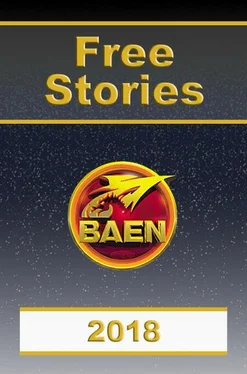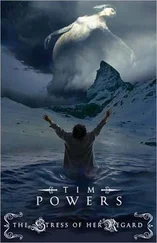The boat began to tilt, forward, driving down. Almost as quickly as an emergency dive, but it was just the weight of the boat that was giving them the extra impetus to sink. There was a delicate trade-off, Goond supposed, between the desire to get deep as soon as they could because only then would they know whether they would meet their doom there; and a natural reluctance to cling to the life they might be leaving, not so fast, take your time, there’s no hurry .
Nobody wanted to die. They wanted to live. That meant the risk of dying. Ellie Vilsohn floated his hands in the air, giving instructions for the hydroplanes, decreasing angle of dive, continuing to descend . Maintaining control of the boat as it went deeper. No steeply-sloping slides, no forgotten bits of crockery going flying; no.
Only the boat sinking, sinking, there was one hundred meters, there was the horrid creaking of the wood veneer panels over cabinet doors, there were the groanings and snappings which signified the reaction of the superficial elements of interior trim to changing air pressure—or the leaking, rupturing, fracturing of the pressure hull itself—or nothing.
Should he just go lie down on his bunk, and wrap the pillow around his head to cover his ears and muffle the sounds? It wasn’t as though there would be depth charges. He could have a nap, almost. No. He couldn’t go lie down. He had to watch, with fascination, as the boat continued its dive. One hundred and thirty. One hundred and forty-five.
He had heard the boasting stories in the officers’ mess between war cruises, who had not? But was all hearsay. The design specifications said that boat was meant to go to no more than two hundred and thirty meters with safety, but the boat could go to two hundred and fifty. The boat could go to two hundred and seventy-five meters.
Nobody had ever sat across from Goond and claimed to have been on the boat that had come up from two hundred and eighty-five meters. Goond had never been below two hundred and ten—that he could swear to—but how far down they’d been in the Arctic he did not know. “How deep do we go, Herr Kahloin?” Ellie asked, and Lachs stirred himself.
“We go down until everything breaks.” Perhaps not completely helpful, Goond thought, when “everything” could include the pressure hull itself. Clearly there was some sort of a guideline in Lachs’ mind; but nobody challenged him—because they trusted his judgment, not just because he was the commander. The Smoking Salmon was not that kind of boat. “Then we surface, and see what’s what. We don’t have to get all the way back to Norway. We only need to get out to the Gulf.”
So they went down. One hundred and thirty meters. One hundred and sixty. One hundred and eighty-five. Where would they be, when would they be, when they came up? Goond had a private suspicion, but it was too speculative, even with all of the unreality that surrounded them already.
Two hundred and thirty meters, maximum depth for the IX-C/40. Two hundred and forty meters, and continuing to dive. Why had U-818 surfaced in Lake Superior, of all places? Had nobody else wondered? Nobody had spoken of it if they had, not in Goond’s hearing. Lachs himself had confided no suspicions. Everybody knew, though. Everybody knew that Lachs had found his wife and child here.
His wife and his son would not have been foremost in Lachs’ mind when they’d gone down off Hammerfest: Lachs had had plenty of other things to think about. But Goond was certain that the issue had at least arisen in Lachs’ mind, as it did for many of them, during the long hours they’d lain in the depths of the ocean not knowing whether they would live or die.
Now Lachs had found his wife and child, although the boat had had to come to Lake Superior to bring them back together. Lachs had ways to keep in touch with his loved ones going forward, because Charlie Montrose himself had sat down with the radio-men to talk about things like amateur radio “repeater” stations, and “nodes,” and “inter-ties.” All of those ways were here and now, May, 2005.
And for that reason, if for no other reason than blind faith, Goond believed they would reach the Atlantic, and that it would still be May of 2005 when they did so. Because Lachs meant to find the White Whale. And what Lachs meant to do was what was going to happen.
Sufficient unto the day is the evil thereof . They would surface. Or they wouldn’t. And all of the other questions would simply have to wait, perhaps forever.
* * *
On the night her husband had left, again, after all of those long decades of being dead, Emrys had propped the note he’d given her up against the mirror above the dresser in her bedroom, next to the picture of her other dead husband—Charlie Montrose, from whom her son Charlie had adopted his name—and gone to bed, leaving it unopened.
She had an idea of what the note contained. It had been a tradition, if one of few years’ duration; still, they’d been young, in those days, and the separation of months had been as painful as that of years. He would tell her that he loved her. He would tell her that he had to go, he’d sworn his oath, and that he would not be worthy of her love if he did not show himself honest and true in the eyes of the world.
He would tell her that he would be thinking of her, that he would be cherishing thoughts of her as his guide and armor against the challenges he faced, that he would do his best to come back to her loyal and true. And he would tell her again that he loved her.
Hers were of similar tenor, and also similarly repetitive. She loved him. She would always love him. She cherished their son and hoped to cherish their son’s younger brothers and sisters as much, in time. She would pray earnestly and every day for his return. She knew that he would do his duty with courage and honor, but she wanted him back, to her house, to her embrace, to her bed. And she loved him.
When he came home on leave he would bring her last note back with him, and put it in a cigar box that he’d inherited from his grandfather in a drawer with his handkerchiefs and his other odds and ends. Pipe stems with fractured mouth-pieces. Cracked bowls of briars. Stubs of railway tickets. They’d all been lost in the bombing.
Next morning it was waiting for her there, but she didn’t open it. It was too soon. They meant to reach Lake Superior’s deepest waters before they tried their theory out; thirty-six hours, more or less, on the surface and beneath it. It was still there on the morning after that, two days after the Smoking Salmon had departed.
She lay down for a nap after lunch-time because remembering, re-living, grappling with the fact of her husband come back to her from across space and time—only to leave her again—was exhausting. The unopened note had yellowed, the ink on the envelope faded to a rusty brown. She left it where it was. They’d both known there was a risk.
She overslept. It was dark outside by the time she opened her eyes and sat up to go and see about some dinner, near midnight; the quarter-moon was rising north-northeast. She saw the envelope gleaming in the darkness from the corner of the mirror above her dresser, next to the picture she kept there of Charlie Montrose.
Her name was as sharp and crisp as though it had been written yesterday across against the clean white paper. Smiling, she reached for it, and opened it up to read.
* * *
U-818 had sustained damage. Some of the leaks, some of the creaking and groaning of the boat, that had been sustained earlier; there’d been no U-boat pens at Salmon Shore. They were going to have to find a shipyards before they tried this trick again, Goond told himself. Maybe they would go to Brest and ask for some maintenance: the Internet said that the German World War Two submarine pens at Brest were still being used for the same purpose by the French navy.
Читать дальше








![Тим Пауэрс - Последние дни. Том 2 [litres]](/books/393813/tim-pauers-poslednie-dni-tom-2-litres-thumb.webp)
![Тим Пауэрс - Последние дни. Том 1 [litres]](/books/394090/tim-pauers-poslednie-dni-tom-1-litres-thumb.webp)
![Тим Пауэрс - Последний выдох [litres]](/books/402145/tim-pauers-poslednij-vydoh-litres-thumb.webp)